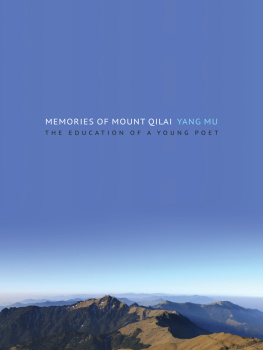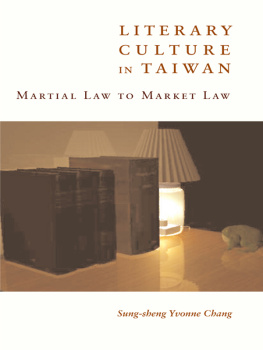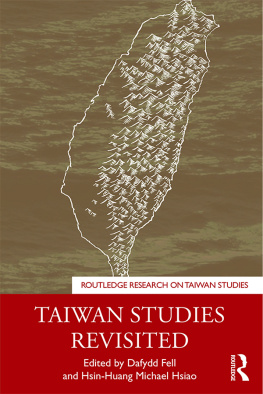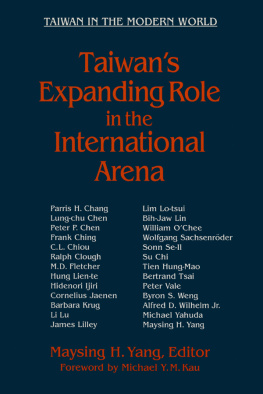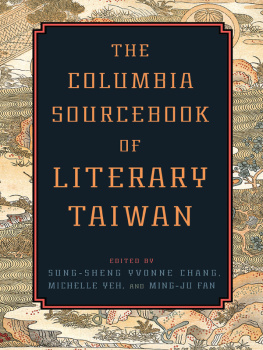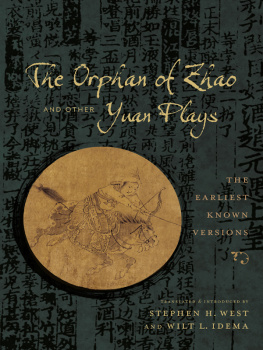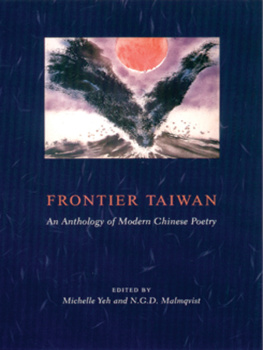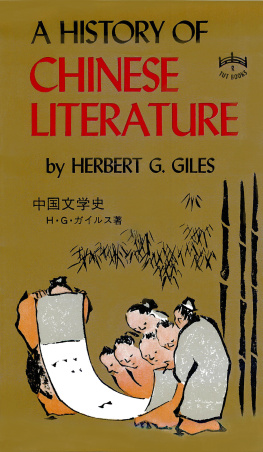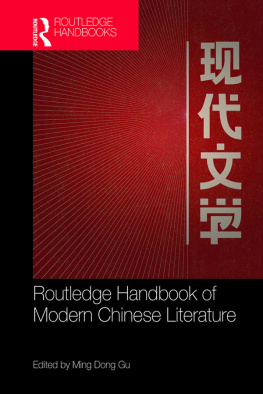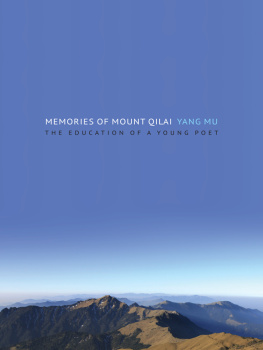MEMORIES OF MOUNT QILAI
Modern Chinese Literature from Taiwan
MODERN CHINESE LITERATURE FROM TAIWAN
Editorial Board
Pang-yuan Chi
Gran Malmqvist
David Der-wei Wang, Coordinator
Wang Chen-ho, Rose, Rose, I Love You
Cheng Ching-wen, Three-Legged Horse
Chu Tien-wen, Notes of a Desolate Man
Hsiao Li-hung, A Thousand Moons on a Thousand Rivers
Chang Ta-chun, Wild Kids: Two Novels About Growing Up
Michelle Yeh and N. G. D. Malmqvist, editors, Frontier Taiwan: An Anthology of Modern Chinese Poetry
Li Qiao, Wintry Night
Huang Chun-ming, The Taste of Apples
Chang Hsi-kuo, The City Trilogy: Five Jade Disks, Defenders of the Dragon City, Tale of a Feather
Li Yung-ping, Retribution: The Jiling Chronicles
Shih Shu-ching, City of the Queen: A Novel of Colonial Hong Kong
Wu Zhuoliu, Orphan of Asia
Ping Lu, Love and Revolution: A Novel About Song Qingling and Sun Yat-sen
Zhang Guixing, My South Seas Sleeping Beauty: A Tale of Memory and Longing
Chu Tien-hsin, The Old Capital: A Novel of Taipei
Guo Songfen, Running Mother and Other Stories
Huang Fan, Zero and Other Fictions
Zhong Lihe, From the Old Country: Stories and Sketches from Taiwan
Memories of Mount Qilai
THE EDUCATION OF A YOUNG POET
Yang Mu
Translated by John Balcom and Yingtsih Balcom
COLUMBIA UNIVERSITY PRESS
NEW YORK
Columbia University Press wishes to express its appreciation for assistance given by the Chiang Ching-kuo Foundation for International Scholarly Exchange and Council for Cultural Affairs in the preparation of the translation and in the publication of this series.
Columbia University Press wishes to express its appreciation for assistance given by Mr. Tzu-hsien Tung, Chairman of the Pegatron Corporation, in the publication of this book.
Columbia University Press
Publishers Since 1893
New York Chichester, West Sussex
cup.columbia.edu
Copyright 2015 John Balcom and Yingtsih Balcom
All rights reserved
E-ISBN 978-0-231-53852-7
Library of Congress Cataloging-in-Publication Data
Yang, Mu, 1940-
[Qilai qian shu. English]
Memories of Mount Qilai : the education of a young poet / Yang Mu ; translated by John Balcom and Yingtsih Balcom.
pages cm. (Modern Chinese Literature from Taiwan)
ISBN 978-0-231-16996-7 (cloth : acid-free paper) ISBN 978-0-231-53852-7 (electronic) 1. Yang, Mu, 1940Childhood and youth. 2. Poets, ChineseTaiwan20th centuryBiography. I. Balcom, John, translator. II. Balcom, Yingtsih, translator. III. Title.
PL2924.S47Q5813 2015
895.1152dc23
[B]
2014016449
A Columbia University Press E-book.
CUP would be pleased to hear about your reading experience with this e-book at .
COVER PHOTO: MATTHEW LIANG GETTY IMAGES
COVER DESIGN: MILENDA NAN OK LEE
References to websites (URLs) were accurate at the time of writing. Neither the author nor Columbia University Press is responsible for URLs that may have expired or changed since the manuscript was prepared.
CONTENTS
Yang Mu was born Wang Ching-hsien in Hualien, Taiwan, on May 7, 1940. A poet, essayist, scholar, and translator, he has published over sixty volumes of poetry and prose. Considered by many to be the greatest living Chinese poet, he is also one of the most distinguished Chinese prose stylists and essayists.
The Former Book of Mount Qilai, Yang Mus collection of autobiographical essaystranslated here as Memories of Mount Qilaiappeared originally as three volumes, published over a ten-year period: Mountain Wind and Ocean Rain (1987), Return to Degree Zero (1991) Long Ago, When We Started (1997). They were published as a single volume in 2003 and form an integral whole. The book is one of the most significant autobiographical works, in terms of style and content, to appear in Taiwan in recent decades. The collection was supplemented in 2009 with a sequel entitled The Latter Book of Mount Qilai, which focuses more on the authors pursuit of his literary studies and his interactions with others, such as the translator Lin Yiliang and Ya Xian, a well-known poet.
Strictly speaking, the book is a partial autobiography of the poet, because it covers only the formative yearsthe first twenty-some years of his inner and outer liferecalled and recorded decades later. He was born during the Japanese occupation and grew up in the Republic of China (ROC) under the authoritarian Nationalist government. This is not a mere chronological account of the authors life, but something far more impressionistic. Yang Mus description of events is largely anecdotal and sometimes humorous. The depiction of the historical milieu in which he grew up is subtle and indirect, and never judgmental. It is, of course, written from the perspective of a young Taiwanese observing the changes going on around him. He yokes together inner abstractions and detailed descriptions of the outer world to create a dense and expressive prose style complete with classical allusions.
A work of art like Goethes Dichtung und Warheit, Memories of Mount Qilai offers the reader insights into the genesis of an artist. Covering the authors childhood and youth to young adulthood, the book traces his personal and artistic development, shaped by his contact with Taiwans natural environment and the rather complicated history of the island. The chronological trajectory of the text starts with the author as a young child taking in the details of the small world immediately around him in his house and back yard. This occurs during the final years of the Japanese occupation. The text moves from this small world outward in a broadening sweep, in an ever-deepening engagement with society.
The Natural Environment
It is obligatory to begin any discussion of Taiwan by referring to its historical appellation of Formosa, from the Portuguese Ilha Formosa, meaning Beautiful Island. The geography and landscape are formative and sustaining influences on the poetfrom start to finish, the mountains and ocean are abiding presences in the book, stirring both his soul and his imagination. Taiwan lies 112 miles off the coast of southern mainland China astride the Tropic of Cancer, which gives it a humid, subtropical climate. It covers about 14,000 square miles and is slightly larger than Belgium. Geologically, Taiwan was formed at the boundary where the Eurasian tectonic plate is subducted under the Philippine plate. The fault runs the length of the island, and the upthrust block has given Taiwan its largely mountainous terrainfive mountain ranges run parallel to the east coast. The boundary is still active, producing a great number of earthquakes, and the mountains continue to rise. Most of the islands population resides on the narrow and fertile western plains. Hualien, the authors hometown, is located on an alluvial plain on the northeastern coast, facing the Pacific Ocean. Taiwan sits on the Northwest Pacific cyclone basin and is struck by typhoons an average of four times a year, from July to October. The typhoons and earthquakes made deep and early impressions on the author.

